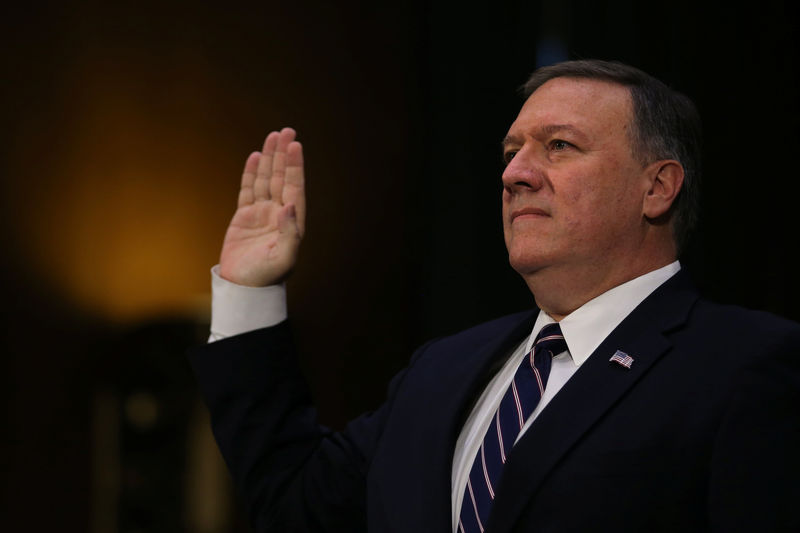By David Alexander and Jonathan Landay
WASHINGTON (Reuters) - Donald Trump's nominee to head the CIA sought on Thursday to repair damage from the president-elect’s feud with U.S. intelligence agencies, saying he accepted their findings on Russian hacking, would not comply if ordered to renew use of harsh interrogation techniques and would always “have their backs.”
Mike Pompeo’s testimony at his Senate confirmation hearing appeared aimed at reassuring staff at the agency he has been picked to lead, even at the risk of contradicting or distancing himself from some of Trump’s strongest criticism of the intelligence community.
Diverging from Trump's stated aim of seeking closer ties with Russia, Pompeo accused the Russian leadership of “aggressive action” in meddling in the November U.S. elections, of "asserting itself aggressively" by occupying part of Ukraine and of doing "doing nearly nothing" to destroy Islamic State.
Pompeo, a Republican member of the House of Representatives and a former U.S. Army officer, insisted that if necessary he would be ready to stand up to Trump, who takes office on Jan. 20, and would shield CIA operatives against any effort to politicize its work.
“You have my commitment that every day, I will not only speak truth to power, but I will demand that the men and the women (of the CIA) ... follow my instruction to do that each and every day,” he said.
For weeks, the Republican president-elect questioned the intelligence agencies' conclusion that Russia used hacking and other tactics to try to tilt the election in his favor - an unprecedented breach between an incoming U.S. leader and the intelligence operatives he will soon command.
Trump said on Wednesday that Russia was behind the hacking but that other countries were hacking the United States as well.
Asked about the hacking, Pompeo said he was very clear about what he called an "aggressive action" ordered by the Russian leadership, and accepted the U.S. intelligence report on the matter. "I’ve seen nothing to cast any doubt on the findings in the report," he said.
Trump this week also furiously denounced intelligence officials for what he said were leaks to the media by intelligence agencies of a dossier that makes unverified, salacious allegations about his contacts in Russia.
By contrast, Pompeo voiced strong support for the agency, saying he has seen Central Intelligence Agency staff "walk through fire."
He said he understood it would be a problem “if folks were afraid there would be political retribution” and promised “to have their backs at every single moment. You have my word I will do that.”
INTERROGATION TECHNIQUES
Pompeo also signaled he would stand firm if necessary against Trump on the issue of enhanced interrogation techniques for terrorism suspects. Such techniques, which were introduced under President George W. Bush after the Sept. 11, 2001 attacks on the United States, are widely regarded as torture and their use has been banned by Congress.
Trump said during the election campaign the United States should bring back tactics such as waterboarding, which simulates drowning, although since the election he has said he has heard arguments against such methods.
Asked about the issue, Pompeo said that he would "absolutely not" restart enhanced interrogation techniques by the CIA if asked by the president-elect.
He noted it would take a change in the law for the CIA to use interrogation techniques that go beyond those permitted by the Army, adding he could not imagine that Trump would order the CIA to use illegal methods.
Pompeo, a conservative lawmaker from Kansas who is on the House Intelligence Committee, emphasized that he would be a neutral assessor of challenges and threats. In opening remarks he said he understood that if confirmed his role would switch from policymaker to provider of information.
Noting that the CIA does not make policy on any country, he added, "it is a policy decision as to what to do with Russia, but it will be essential that the Agency provide policymakers with accurate intelligence and clear-eyed analysis of Russian activities."
Equally, he said that he would drop the opposition he has had as a lawmaker to the 2015 nuclear deal between Iran and major powers. He said the CIA must be "rigorously fair and objective" in assessing the deal.
But he called the Iranians “professionals at cheating” and said he would work to improve U.S. capability to detect violations of Tehran’s commitment to curb its nuclear activities.
He called Iran an "emboldened, disruptive player in the Middle East, fuelling tensions" with Sunni Muslim allies of the United States.
Pompeo listed it among the challenges facing the United States along with what he called a "resilient" Islamic State and the fallout from Syria's long civil war.

Pompeo also named North Korea, which he said had "dangerously accelerated its nuclear and ballistic missile capabilities." He said China was creating "real tensions" with its activities in the South China Sea and in cyberspace as it flexed its muscles and expanded its military and economic reach.